27. Supreme Justice
Illustration
I don't know how many of these I can do, and still claim I hardly ever comment on the illustrations! Anyway, I asked the AI for a picture of John Coltrane dressed as Jesus Christ, and this is what I got. Bam, done. One of the easiest pictures ever.
Quote
It's by jazz saxophonist Albert Ayler, about his friend and mentor, John Coltrane. It suggests that he thought Coltrane had come to Earth for a particular spiritual mission, and was possibly an avatar, like Dennis will be. Julian seems to agree with this assessment in the story.
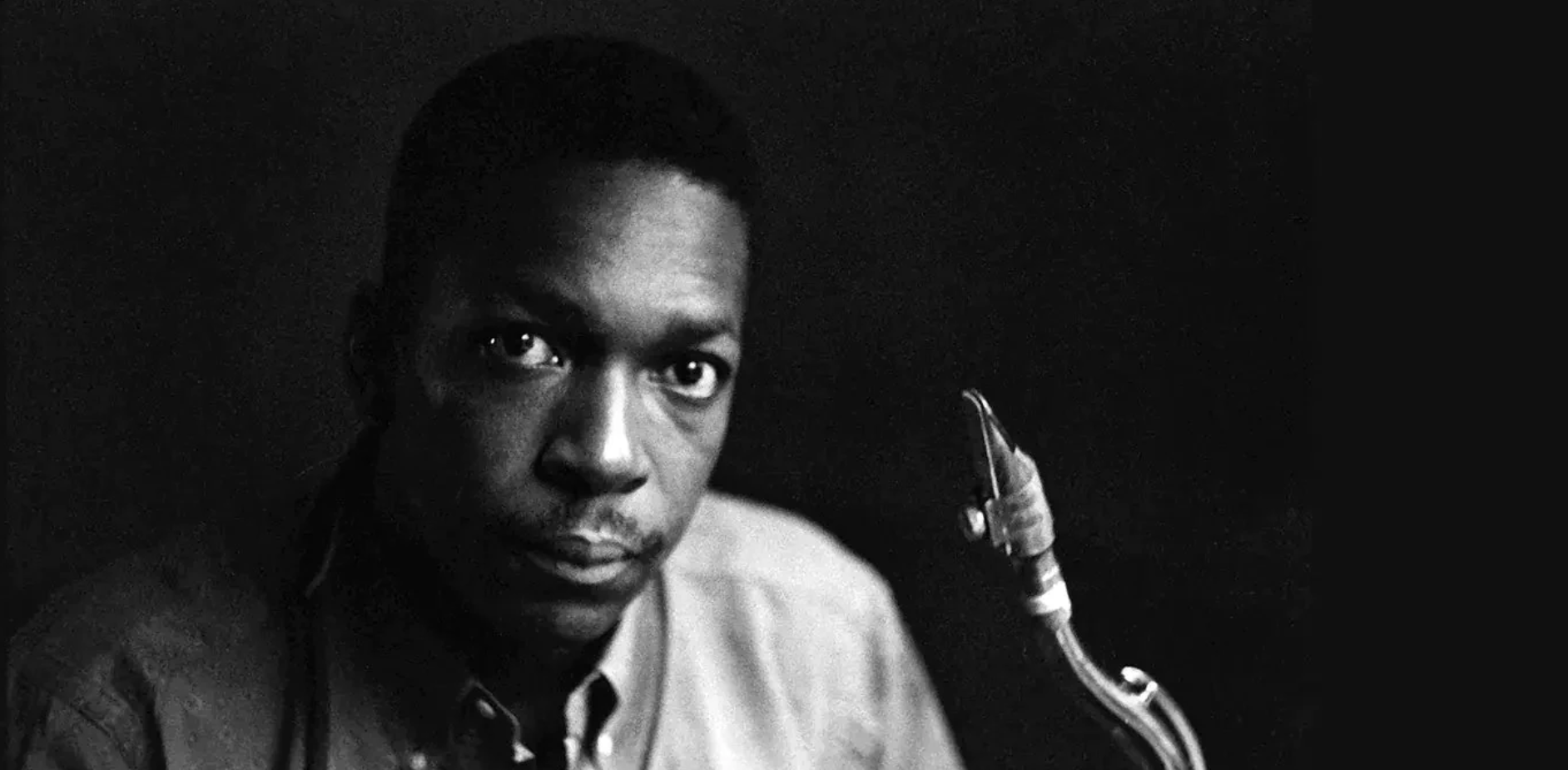
John Coltrane
In this chapter, John Coltrane is revealed to be the Supreme Justice of the Universe. John Coltrane was a very spiritual, and very intense, jazz saxophonist active from the 1940s to the 1960s. His spiritual beliefs were universal, and he said he believed in all religions.
In real life, he was posthumously worshipped as a god, then less controversially, as a saint, by the St John Will-I-Am Coltrane African Orthodox Church in San Francisco, so it didn't seem out of character for him to be the Supreme Justice of the Universe. This Episcopalian church is still active, and holds five-hour jazz sessions each Sunday, interspersed with liturgy, sermons, and fellowship.
He is one of Julian's favourite jazz musicians – something which Julian also gave to his alter ego on The Mighty Boosh, Howard Moon. I chose John Coltrane to be the Supreme Justice for this reason, and because his initials are J.C., to suggest a link with Jesus Christ.
It was quite difficult to bring John Coltrane to life, as he isn't exactly a familiar or recognisable celebrity. I spent a lot of time watching and listening to him being interviewed on YouTube videos (unfortunately no longer available, but you can hear audio recordings). He was very fascinating; a highly charismatic man, yet self-effacing and softly spoken. Getting that balance between the sense of his innate power, and his lack of ego was the hardest part.
For Reasons!
When John Coltrane looks at Julian, he immediately identifies him as Noel's soulmate, and "a living soul brought to the Waystation, for reasons you know not."
This is a major clue for the reader that all the mistakes and mix-ups Julian has experienced were no random events or coincidences. His coming to the Waystation while still alive was orchestrated as part of a higher plan, and if Pauline didn't know something about it, I'll eat my hat.
Note that John Coltrane says "for reasons", not "for what reason". The reasons why this happened will become gradually clearer. Time to get those notebooks out again!
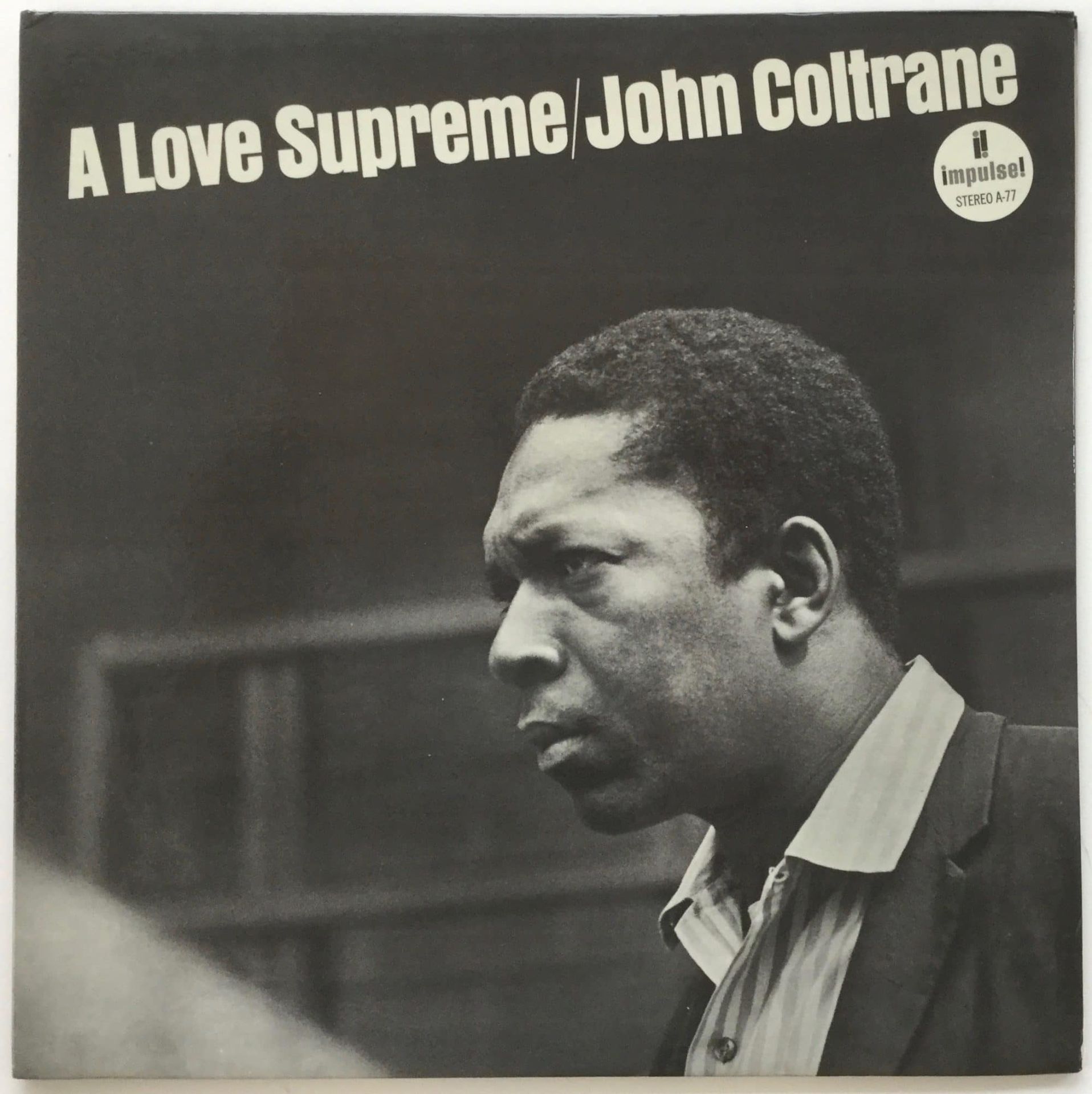
A Love Supreme
John Coltrane says that it is truly a love supreme, when soulmates find each other no matter where in the Universe they may wander.
A Love Supreme is a 1965 album by John Coltrane. It is one of his best-selling albums, and is widely regarded as his masterpiece. Structured into a suite in four parts, it has been interpreted as a struggle for purity, and an expression of gratitude to a higher power. One of the most acclaimed jazz albums of all time, it has been recognised as a deeply spiritual work, and hailed as one of the most important albums in postwar jazz.
Quotes from John Coltrane
I weaved real quotes from John Coltrane into his dialogue, to give a flavour to his words.
"Thankfully now, through the merciful hand of God, I do perceive and have been fully re-informed of his omnipotence. It is truly a love supreme."
"One positive thought produces millions of positive vibrations."
"Damn the rules, it's the feeling that counts."
"Over all, I think the main thing a musician would like to do is give a picture to the listener of the many wonderful things that he knows of and senses in the universe..."
"You have to delve deep into yourself to find out what you're capable of doing."
"When you begin to see the possibilities of music, you desire to do something really good for people."
Although there isn't really a quote along these lines, Coltrane was famous for his rigorous work ethic, practising music and studying music theory for hours every day.
The Legend of the Spirit of Jazz
John Coltrane says to Julian, "My son, I feel the spirit of jazz in you."
This is reference to the episode "Electro" in The Mighty Boosh TV show, where Howard/Julian signs a Faustian agreement to get the Spirit of Jazz inside him. The Spirit of Jazz is played by Noel, and naturally he gets 'inside' Julian in the most embarrassing way possible.
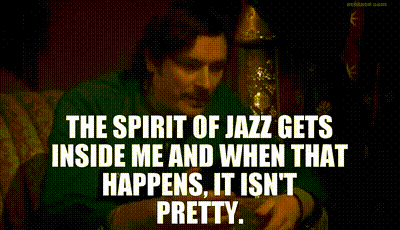
The plot is a reference to American blues musician Robert Johnson, whose recording career only lasted seven months, but who is nonetheless recognised as a master of the blues, and one of the most influential music artists of the 20th century. The Rock and Roll Hall of Fame describes him as 'the first ever rock star'.
Legend has it that Robert Johnson sold his soul to the devil (or an African trickster god) in exchange for musical talent; the story is supposedly to explain his rapid mastery of the guitar. 'Lots of practice' was apparently too boring an explanation.
The legend probably got started because Johnson underwent a year of intense musical training, and used to practice in graveyards at night, because it was quiet. Okay, that last part sounds like a deliberate attempt to get a rumour going!
Adding to Robert Johnson's mystique is that he died at the age of 27 in 1938, of unknown causes, and is buried in an unmarked grave. Rumour has it that he was murdered by poison, but more likely he died of congenital syphilis (passed to the baby from the mother during childbirth), and/or that he had a genetic disorder such as Marfan Syndrome. Whatever the truth, he is the first known member of the infamous '27 Club' – music icons who died at the age of 27.
John Coltrane's Prophecy
Julian hesitantly asks John Coltrane if he will ever be a great jazz musician. Coltrane says he won't, but Julian will be famous, and his music known all over the world, in ways he cannot now imagine, and that companions and helpmates will be sent to aid him.
Julian's music for The Mighty Boosh is available all over the world, in ways that didn't exist in the early 1990s, such as YouTube, streaming services, digital radio, DVDs, and so on. And lots of people worked with The Mighty Boosh as part of their shows.
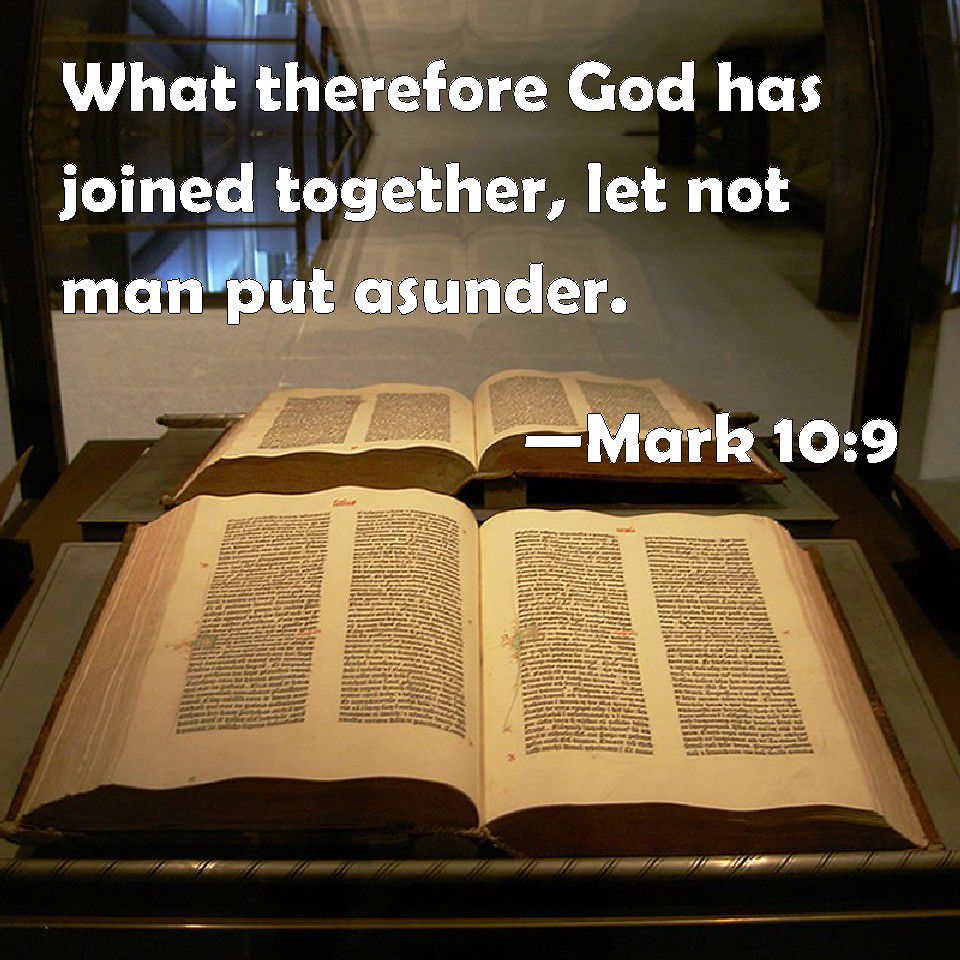
Biblical References
There are quite a few in this chapter – not surprising when you think that John Coltrane is 'standing in' for another famous J.C.
John Coltrane decrees that Noel will return to the Earth from whence he came, to accompany Julian on his journey. John Coltrane is giving a nod to Ecclesiastes 12:7: "For then the dust shall return to the earth from whence it came, and the spirit shall return to God." It's familiar from the funeral service, and in a sense, Coltrane is performing a 'reverse funeral' for Noel, in which his body and soul are both given back to the Earth, rather than his soul being given to Heaven.
John Coltrane reverses the effects on Noel of being at the Waystation – he kisses his brow lightly, so that Noel becomes pinker and more 'alive' looking, and his beauty less celestial and more earthly. It's very similar to people being raised from the dead in the Bible – it's interesting that whenever this rare miracle is performed, it is with a minimum of fuss, with absolutely no hint of showmanship or abracadabra about it. In the same way, a simple kiss from the Supreme Justice is enough to have Noel ready to return to Earth. He isn't actually alive yet, but he is no longer so close to Forward that he cannot come back.
John Coltrane says, "those who Love have joined together, let no person put asunder". This is based on Matthew 19:6: "Wherefore they are no longer twain, but one flesh. What therefore God hath joined together, let not man put asunder." It is familiar from the marriage service, and in a sense, John Coltrane is performing a 'reverse wedding' on Julian and Noel, who are not married under God's law, but soulmates under Love's law, by sending them back to Earth together.
John Coltrane says to Marcus, "Well done, my good and faithful servant." This is from a parable in Matthew 25:21: "His lord said to him, 'Well done, good and faithful servant; you were faithful over a few things, I will make you ruler over many things'".
A Higher Law
Dharmayama objects to his judgment being overturned (in regards to Noel; he accepts that a mistake has been made in Julian's case, which he investigated and rectified as soon as he could). He argues that Divine Law states that once someone has been assessed as worthy to go Forward, they must continue going Forward, and can never come Back. He is such a 'by the book' judge!
John Coltrane reminds the Chief Justice that there is a Higher Law - "those who Love have joined together, let no person put asunder". Coltrane says that Nasati once broke the Higher Law - again, telling us that it was Dharmayama who was responsible for originally separating Miranda and Rudi. Nasati says it was almost a thousand years ago, and he'd "only" been a judge for fifty years at that time. Miranda and Rudi seem to have first come to the Waystation about 850 years before Julian and Noel, so Nasati has been a judge for about 900 years!
In retrospect, the part about the Higher Law trumping Divine Law vaguely reminds me of C.S. Lewis' The Lion, the Witch and the Wardrobe, where Deep Magic from the Dawn of Time is overturned by Deeper Magic from Before the Dawn of Time. There's not much similarity otherwise.
Setting Right The Wrong
Dennis tells John Coltrane that he thinks Nasati would have made a different decision in regards to Miranda and Rudi if he had been with his soulmate at the time. That suggests that Nasati split Miranda and Rudi up because he didn't fully understand how painful an experience it would be for them. Hopefully he became a much better judge once Dennis went Forward and joined him.
(It's a major error on Dharmayama's part, but it has been well and truly established by now that people at the Waystation are human, flawed, and make mistakes, despite their best intentions.)
John Coltrane tells Nasati Dharmayama that as soon as he sets right what he did wrong, he will be permitted to retire as a judge, and may then join Dennis on Earth, to act as his assistant. This tells us that you can't retire as a judge whenever you feel like it, and that Nasati has been deliberately kept in the position until such time as he is able to send Rudi Forward. It has in fact, been something of ... not a punishment, but a bit of a Purgatory for him. He's had to keep doing his job until he gets it right.
When Dharmayama is able to finally step down, none other than Marcus Hoffman will be promoted to judge in his place, as a reward for helping to save Julian's life and soul. The story doesn't say so, but I imagined that as a result, Eleanor the assistant would be promoted to Case Worker to replace Marcus. Her work and research was invaluable in saving Julian!
I really feel as if Mary should also get some sort of recognition, but I couldn't keep the chapter going on and on with everyone getting rewarded! I mean, why not Pauline as well? I'm sure it all goes down on their record or something.
My Sweet Lord
Dharmayama calls John Coltrane "my sweet Lord" in gratitude to being allowed to be with Dennis; a reference to the 1970 song "My Sweet Lord" by George Harrison. The song is sung in praise of the Hindu god Krishna, blending the Hebrew "Hallelujah" with chants of "Hare Krishna" and Vedic prayers, so it seemed very suitable for Nasati Dharmayama.
Note that the lyrics say, "But it takes so long, my Lord" and then, "But it won't take long, my Lord". Is this is a clue, or simply a comment on the nature of timelessness in the Afterlife?
https://youtu.be/SP9wms6oEMo
Marcus
Far from losing his head over a future promotion, Marcus doesn't even take his foot off the pedal. After a quick thank you to John Coltrane, Marcus tells the Chief Justice he will be submitting a formal request that when Julian arrives at the Waystation again at the end of his life, he should be allowed to go Forward immediately to make amends for the inconvenience he has been through thanks to bureaucratic errors.
Just as Mary considers Julian her patient until he leaves the Waystation, Marcus obviously sees himself as Julian's Case Worker until the very end. He is still advocating for him! And this is a little assurance to the reader that they don't have to worry about Julian being put through this process again – when the time comes, far in the future, he will definitely be going Forward!
The chapter closes with Marcus getting a message on his beeper saying that he has just been assigned as Case Worker to The Other Julian, Julian Peter Barratt, who has now arrived at the Waystation. He lets the judge know that he will be advocating for him to go Forward immediately as well, in compensation for the pain and suffering he's been through. Now the reader can relax, knowing that The Other Julian is in safe hands.
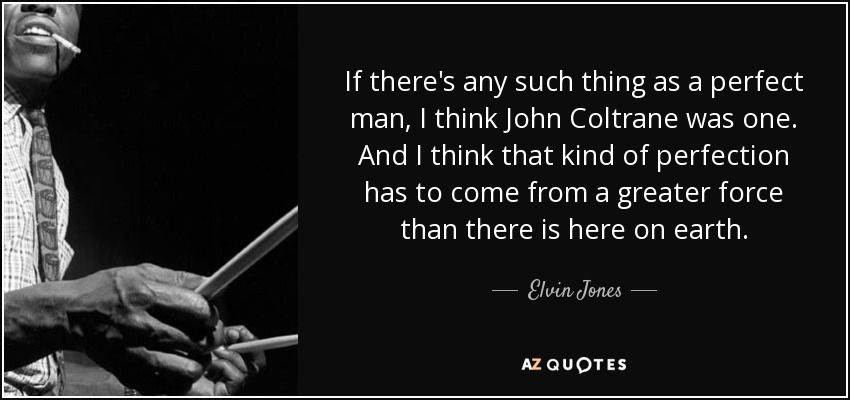

Bạn đang đọc truyện trên: AzTruyen.Top